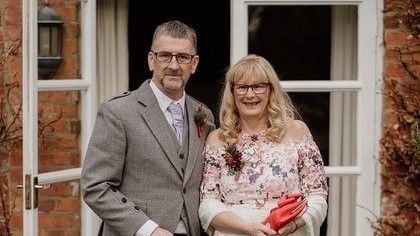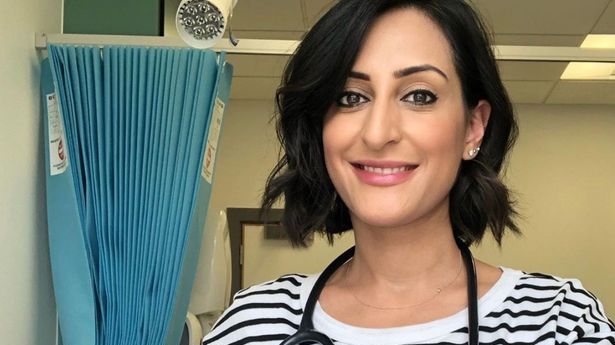
Press release -
Devon stroke survivor urges people to check for ‘silent condition’ which can cause serious strokes
A stroke survivor from Bideford is backing a charity’s plea for people to carry out a simple test on themselves in case they have a ‘silent condition’ which could cause a serious stroke.
The Stroke Association is urging people to mark Stroke Prevention Day on Thursday 12 January by checking their own pulse to make sure it’s not irregular.
Ian Murdoch’s stroke was caused by atrial fibrillation or ‘AF’, where the heart beats with an irregular rhythm. When this happens, the heart won’t empty all of the blood out of its chambers with every beat and the leftover blood can form clots which travel to the brain, blocking off blood flow and causing a stroke.
Former MoD policeman Ian was diagnosed with AF in 2012, just before he was to work at the London Olympics as an Athletics Volunteer. He was prescribed beta blockers and blood thinners but had a mini stroke in April 2016, then a full stroke four months later when he was aged 58.
Ian’s stroke has left him with right sided weakness in both his arm & leg, as well as other problems including with speech, sight, memory and fatigue.
He’s urging people to check their own pulse for an irregular heartbeat and not dismiss any heart palpitations they may have.
“AF can vary depending how bad it is,” said Ian. “My pulse would be tap, tap, then a space, then tap, then tap tap tap, slowing down and then speeding up.
“The effects vary depending how bad it is. Sometimes it’s just dizziness, or you feel lethargic. You get to know your own body, so you know the signs.
“Since my stroke I’ve had a pacemaker fitted to control it, although I do have episodes of AF so we’re looking at another operation.
“Checking your pulse could save your life or if you’re doing it to somebody else it could save theirs. The body is the best warning system - if you know that something is happening, get it checked out straight away. Mr Google isn’t always correct!
“People think palpitations are just palpitations but they’re not always. There is a lack of knowledge about this and the more we can educate people the better.”
After his stroke, Ian and his wife Carol moved to Devon for a better life and a house where they could better manage their health problems.
He has been supported by the Stroke Association and is a member of the North Devon Life After Stroke group, which recently won an award in Active Devon's Active for Good Awards. Stroke survivors meet every Friday to socialise and support each other.
“I continue on a daily basis to have problems and thankfully I have a lovely understanding wife and family who support me. It is a struggle sometimes and it gets me down but I’ve survived. Some people in my group have had three strokes in the past year and we all give support and advice when needed,” said Ian.
It is estimated that around half a million people in the UK are living with undiagnosed AF. It is linked to around one in five strokes and strokes in people with AF are more severe and are more likely to result in death or serious disability.
A survey by the Stroke Association to mark Stroke Prevention Day on Thursday 12 January revealed that almost four out of five people (79%) in the South West did not know that AF is a major cause of stroke.
The charity has a video guide on its website at www.stroke.org.uk/spd23 showing people how they can check their own pulse on their wrist or neck.
Jacqui Cuthbert, the Stroke Association’s associate director for the South West and Channel Islands, said: “It's worrying that so few people know that a little thing like how your heart beats can lead to a massive stroke.
“AF often has no symptoms and a stroke can strike without warning. Don’t let the first sign of your AF be a sudden and life-changing stroke. With early diagnosis and effective management of AF, your risk of a stroke dramatically decreases so it’s vital to get checked regularly.
“It’s really easy to check your own pulse and our research told us that most people are able to. Feel for your pulse on your wrist or neck to make sure it has a regular beat. If you suspect you have an irregular pulse, contact your GP Practice.”
Topics
Categories
- Stroke strikes every five minutes in the UK and it changes lives in an instant.
- The Stroke Association is a charity working across the UK to support people to rebuild their lives after stroke. We believe that everyone deserves to live the best life they can after stroke. From local support services and groups, to online information and support, anyone affected by stroke can visit stroke.org.uk or call our dedicated Stroke Helpline on 0303 3033 100 to find out about support available locally.
- Our specialist support, research and campaigning are only possible with the courage and determination of the stroke community and the generosity of our supporters. With more donations and support, we can help rebuild even more lives.
- You can follow us on Twitter, Facebook and Instagram.



